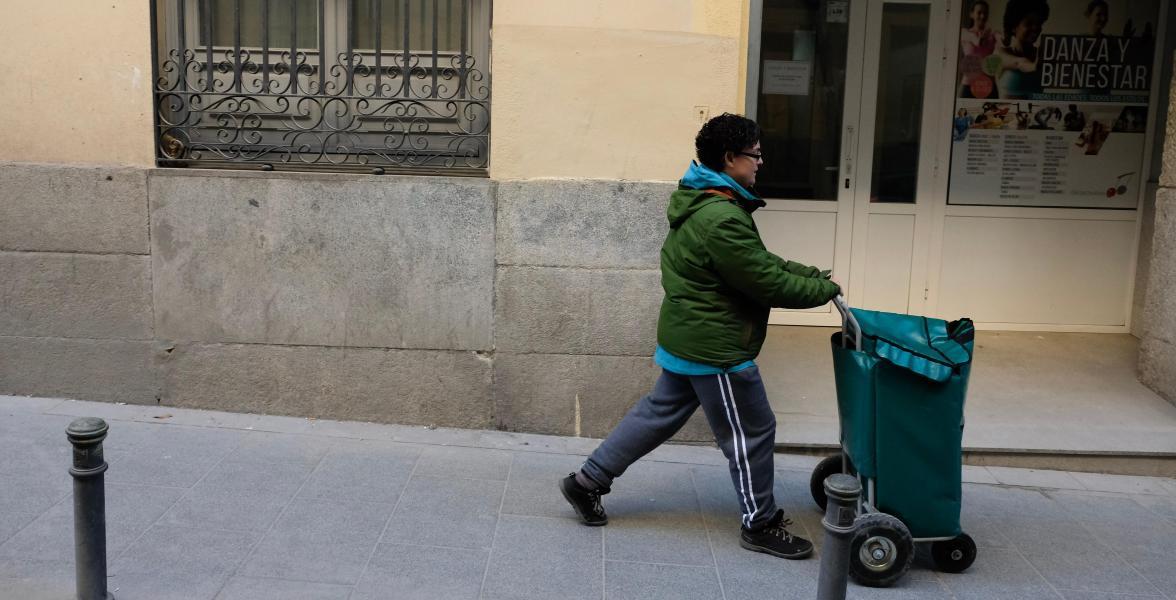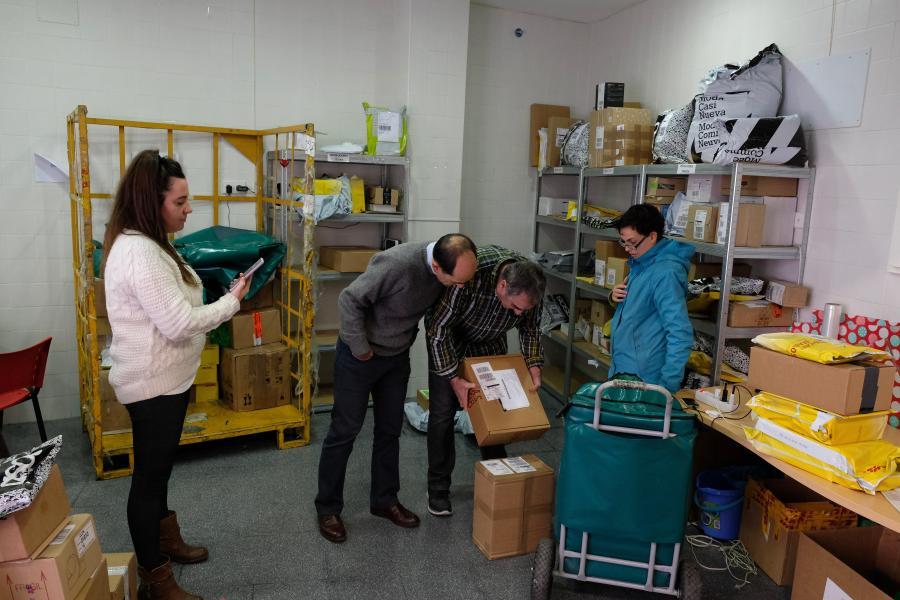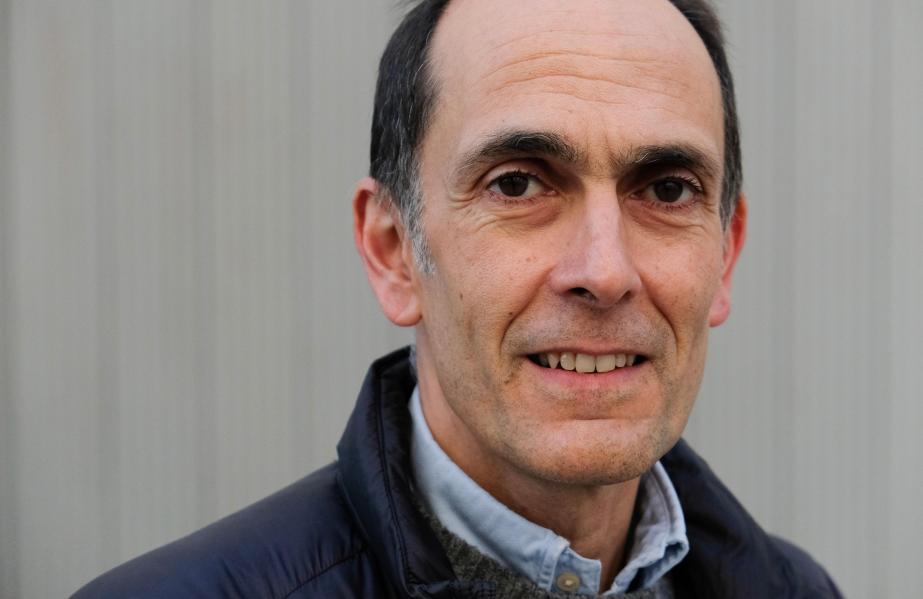
Sara Bermejo, 33, is a delivery person, who works in Koiki’s office in the Mercado Municipal de Barcelo in central Madrid. ©Chris Welsch
A social start-up is doing environmentally friendly home delivery while providing jobs for disabled people in Spain
On a sunny Thursday in central Madrid, Sara Bermejo pushed a green handcart loaded with packages through the narrow streets near the Mercado Municipal de Barceló.
She greeted a shopkeeper standing in one doorway, and then at an intersection exchanged waves with a delivery truck driver she knows, also out on his rounds.
At Leopotamo, a children’s shoe store, she opened the door, backed her handcart into the boutique and picked up a pair of shoes to be shipped a customer in another part of Spain.
Bermejo, 33, works for Koiki, a delivery service that has two goals: One, to cut CO2 emissions in cities by delivering mainly on foot or by bicycle; and two, to provide employment for people with mental or physical disabilities.
“I chose Koiki because I really like their philosophy,” said Carmina Monferrer from the children’s shoe store. “My shop is tiny. I like to work with people close by – I can talk to them about anything. The delivery people are charming and they respond at any time of the day. It’s fantastic working with them.”
Finding a niche
Koiki is the brainchild of Aitor Ojanguren, an entrepreneur who founded the company in 2014. He said he saw a need for a localised delivery service in Europe’s crowded cities, and at the same time saw an opportunity to help give disabled people jobs and a way to integrate in their communities. Furthermore, he believed neighbourhood delivery centres could provide a personalised service — like delivery according to the customer’s schedule and always by the same delivery person — in a way that big operators rarely can.
“It’s a big need everywhere — Paris, London, Madrid,” Ojanguren says. “It’s a very scalable model; it can work anywhere.”
Koiki is one of the past winners in the EIB Institute’s annual Social Innovation Tournament, which recognises and supports European social entrepreneurs whose primary purpose is to generate a social, ethical or environmental impact.
Friendly competition
Koiki’s clients are businesses selling products online, but also the large delivery agencies, like DHL, which sometimes need help to make all their deliveries in the cramped and traffic-clogged streets of dense cities. The delivery companies are also facing restrictions on carbon-emitting vehicles in cities like Madrid, which severely restricted vehicular access to the city centre in 2018 to cut pollution.
“The delivery agencies are both our competitors and our clients,” Ojanguren said. “Our other clients are all in e-commerce, and we work directly with them.”
At the bustling Barceló public market, known in Madrid for its fresh fish and produce, Koiki occupies a stall on the second floor, across the hall from a fishmonger. The company even delivers groceries or fresh fish if clients call for it.
Koiki partners with governmental and non-governmental organisations that provide support to disabled people. Koiki asks these social entities to find and hire the delivery people (whom the company refers to as Koikis) and provides them with a phone app that reads bar codes and tracks and confirms the delivery of parcels. Koiki trains the employees and the local social entities provide a mentor or tutor to provide coaching. The tutors work with managers at Koiki to create a stable, supportive work environment.
“We are like a family here,” said Nerea Ortiz, the manager of Koiki’s Madrid area operation. “We know all the Koikis well, we talk every week to their tutors or mentors and even their families.”
So far, Koiki is operating in several Spanish cities, but Ojanguren’s goal is to expand the company into other parts of Europe. In Spain, the model is growing rapidly, largely thanks to the exponential growth of e-commerce.

From left, Nerea Ortiz, Aitor Ohanjuren, an office worker and Sara Bermejo at work at Koiki’s Mercado de Municipal Barcelo office in Madrid. ©Chris Welsch
Sometimes Koiki can’t keep up with demand:
The Barceló location has four Koikis, each of whom can deliver 40 parcels in a day, for a total of 160. “But yesterday we had 400 packages,” Ojanguren said, drawing a laugh from Ortiz, who added:, “We did finally get it done, but it was stressful.” The company subcontracts with bike messengers to help on days when it is over capacity.
“Last year was extraordinary for us,” Ojanguren said. “We grew 150 per cent from the previous year.” As of December 2018, the company had 100 employees.
Bermejo, one of the full-time Koikis at the Barceló market location, said that she has been working there nine months full-time, after a four-month training period.
What does she like best about her job?
“I like that I know the people here, I know the clients, I have relationships,” she said. “Even with the dogs on the route — I know them, too.”
Author: Chris Welsch
Source: Koiki: Delivering more than packages, taken with the kind permission of the EIB Institute
***
Every year since 2012, social entrepreneurs from different parts of Europe have been competing in the Social Innovation Tournament, directing their efforts and creative minds towards creating unique solutions to everyday problems that are often overlooked. These entrepreneurs have helped marginalised groups, they have engineered solutions to save energy, and they have created communities that empower their members.
EIB Institute will publish these stories in which the entrepreneurs discuss their motivation behind each project, their hopes and ambitions, and their efforts to overcome the hurdles of social entrepreneurship.
Through their projects, they have found their way of creating positive change in this world. How will you become a change-maker? Read these stories and find your inspiration.
 Government of the Republic of Serbia
Government of the Republic of Serbia
















 pdf [271 KB]
pdf [271 KB]
Leave a Comment